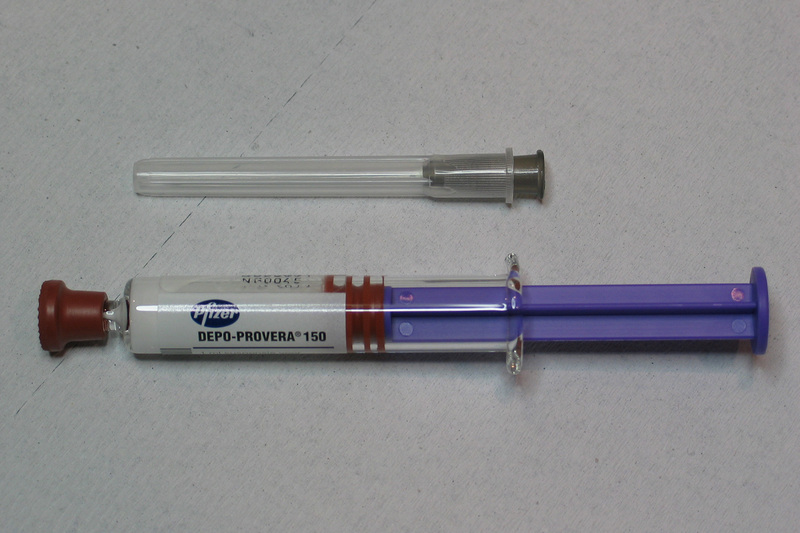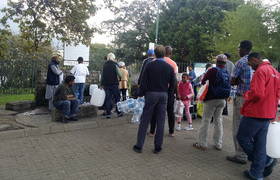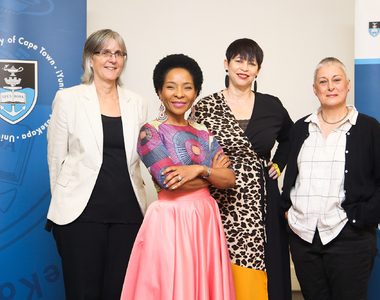Common contraceptive could raise TB risk
15 April 2019 | Story Nadia Krige. Photo Ciell, Wikimedia. Read time 5 min.
A breakthrough study conducted by Professor Keertan Dheda and Dr Michele Tomasicchio, at the University of Cape Town’s (UCT) Centre for Lung Infection and Immunity, has revealed that one of South Africa’s most commonly-used injectable contraceptives could potentially increase women’s chances of contracting tuberculosis (TB).
Injectable contraceptives are widely used across sub-Saharan Africa, being the birth control of choice for about 16.5 million women in the region. The World Health Organization (WHO) cites “their effectiveness, their simple re-injection schedule [every two or three months, depending on the brand] and their suitability for discreet use” as some of the main reasons for their popularity.
Now however, in the case of Depo-Provera – one of the most commonly-used injectable contraceptives – some serious risk factors have cast a shadow over the advantages.
A recent meta-analysis of clinical observational data suggested that Depo-Provera may increase women’s chances of contracting HIV by up to 40%. This is because the injection contains the synthetic hormone medroxyprogesterone acetate (MPA), which acts as an immunosuppressant.
Putting TB under the spotlight
Considering the prevalence of TB in sub-Saharan Africa, and the fact that it remains the top infectious disease killer globally, the team realised the necessity of investigating whether the use of Depo-Provera could also increase the risk of TB infection.
“[We found that] Depo-Provera actually down-regulates immune functions that are associated with protection against TB, and also up-regulates certain cell types that suppress the immune system.”
“We looked at two different injectable contraceptives that are commonly used in South Africa – Depo-Provera and norethisterone enanthate (NET-EN). Our data showed that Depo-Provera subverts TB containment, while NET does not.”
To conduct the study, the team recruited healthy HIV-negative female patients who were not on a contraceptive prior to being enrolled in the study.
Various assays were then used to determine if the two injectable contraceptives subverted TB containment using human cells in the laboratory.
“[We found that] Depo-Provera actually down-regulates immune functions that are associated with protection against TB, and also up-regulates certain cell types that suppress the immune system,” he explained.
While similar studies had previously examined the effects of MPA on mycobacterium TB in animal models, this was the first time that researchers investigated the potential effects in humans.
Making international waves
The groundbreaking findings were published online by the respected Journal of Infectious Diseases late last year.
Coupled with the previous findings that MPA is associated with an increased risk of HIV, the fact that Depo-Provera may possibly also increase women’s chances of contracting TB makes it something of a double-edged sword.
“It’s an important topic from a women’s healthcare point of view, especially considering the fact that Depo-Provera is still extensively administered in clinics throughout South Africa,” Tomasicchio said.
On average, injectables are the contraceptive of choice in 25% of cases. However, in rural KwaZulu-Natal, it is used in up to 85% of clinics.
Tomasicchio would like to see the study results, along with those of future studies, drive a change in policy surrounding Depo-Provera usage in South Africa.
“My ultimate aim is to make sure that women are aware of the dangers of using [Depo-Provera], particularly in the context of sub-Saharan Africa, when the data from ongoing studies have emerged,” he said.
Dheda said that while published epidemiological data suggests that there is an association between MPA usage and increased HIV risk, this has yet to be definitively proven.
“The ECHO study results, which will be released later this year, will tell us definitively about this risk. Further data about TB will also emerge, but our findings raise concern.”
In the meantime, he said, users of Depo-Provera should be aware of the potential risks, and follow good general public health advice, “including getting themselves tested for HIV, taking treatment for HIV if needed, using barrier protection during intercourse, and being aware of TB symptoms and how they can be tested, if appropriate”.
“The ECHO study results, which will be released later this year, will tell us definitively about this risk. Further data about TB will also emerge, but our findings raise concern.”
Safer option
There are certain upsides to using Depo-Provera; costs are lower and it works on a three-monthly reinjection schedule while NET-EN must be administered every two months.
Tomasicchio said he and the team plan to pursue this study further, to gain a better understanding of why and how MPA actually drives TB pathogenesis.
“There’s a lot of mechanistic, laboratory-based studies that can still be done,” he said.
“And, I think moving from here, there can be clever ways to look at MPA in a clinical context.”
Ultimately, he hopes that the emerging evidence showing about Depo-Provera will be taken to heart by the South African government and that appropriate policy changes will be made.
 This work is licensed under a Creative Commons Attribution-NoDerivatives 4.0 International License.
This work is licensed under a Creative Commons Attribution-NoDerivatives 4.0 International License.
Please view the republishing articles page for more information.
Highlights from 2019
As we look back on 2019, we celebrate the top 40 stories that were most popular with readers of the UCT News website during the year.















































